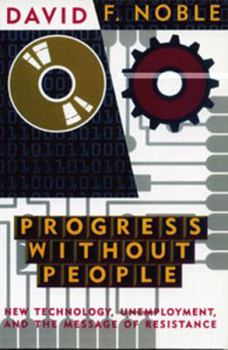Progress Without People: In Defense of Luddism
Select Format
Select Condition 
Book Overview
Cultural Writing. Labor History. In this ground-breaking study, newly available from Charles H. Kerr, scientific historian David F. Noble draws valuable parallels between our era of burgeoning... This description may be from another edition of this product.
Format:Paperback
Language:English
ISBN:1896357008
ISBN13:9781896357003
Release Date:May 1995
Publisher:Between the Lines(CA)
Length:145 Pages
Weight:0.68 lbs.
Dimensions:0.4" x 5.6" x 8.5"
Customer Reviews
2 ratings
Excellent overviews of current problems via history.
Published by Thriftbooks.com User , 21 years ago
Noble does an admirable job of encapsulating and synthesizing the current (2003) dilemma - by deskilling workers and paying them less so the rate of return for business is larger - one ends up with a surplus of goods because the deskilled low paid workers cannot afford said goods.
Outstanding work; clarifies myths re: history of industry
Published by Thriftbooks.com User , 23 years ago
A standard myth is that the Luddites despised technological progress thoughtlessly, simply because it was technological. There are reasons why this story has become standard fare and they are explained in detail by David Noble in his book. The truth is, Luddites did not dislike technological progress in and of itselt, they disliked the particular form it took. Shop tools could be developed to enhance the work of machinists or they could be developed to de-skill workers and place greater control in the hands of management. The latter is the manner in which industry progressed and that is what Luddites protested and why Luddism became a popular movement. To understand technology one should have a sense of the historical context in which it grew and especially the decision-making that led to its growth. Typically, those decisions are conscious and openly discussed, as Noble documents."Progress Without People" is an enlightening and inspiring book, outlining technological progress from the days of the early 19th century through to the late 20th century. Written for popular audiences, the book is still very well documented should people be interested in further researching the subject. In my view this book is a classic, and should be read by anyone interested in the history of industry and technology. The only drawback is that it's published by an obscure publishing company and won't be found on the shelves of most bookstores."Strange business, this crusading spirit of the managers and engineers, the idea of designing and manufacturing and distributing being sort of a holy war; all that folklore was cooked up by public relations and advertising men hired by managers and engineers to make big business popular in the old days, which it certainly wasn't in the beginning. Now, the engineers and managers believe with all their hearts the glorious things their forbears hired people to say about them. Yesterday's snow job becomes today's sermon." --Kurt Vonnegut, "Player Piano" (1952) .





